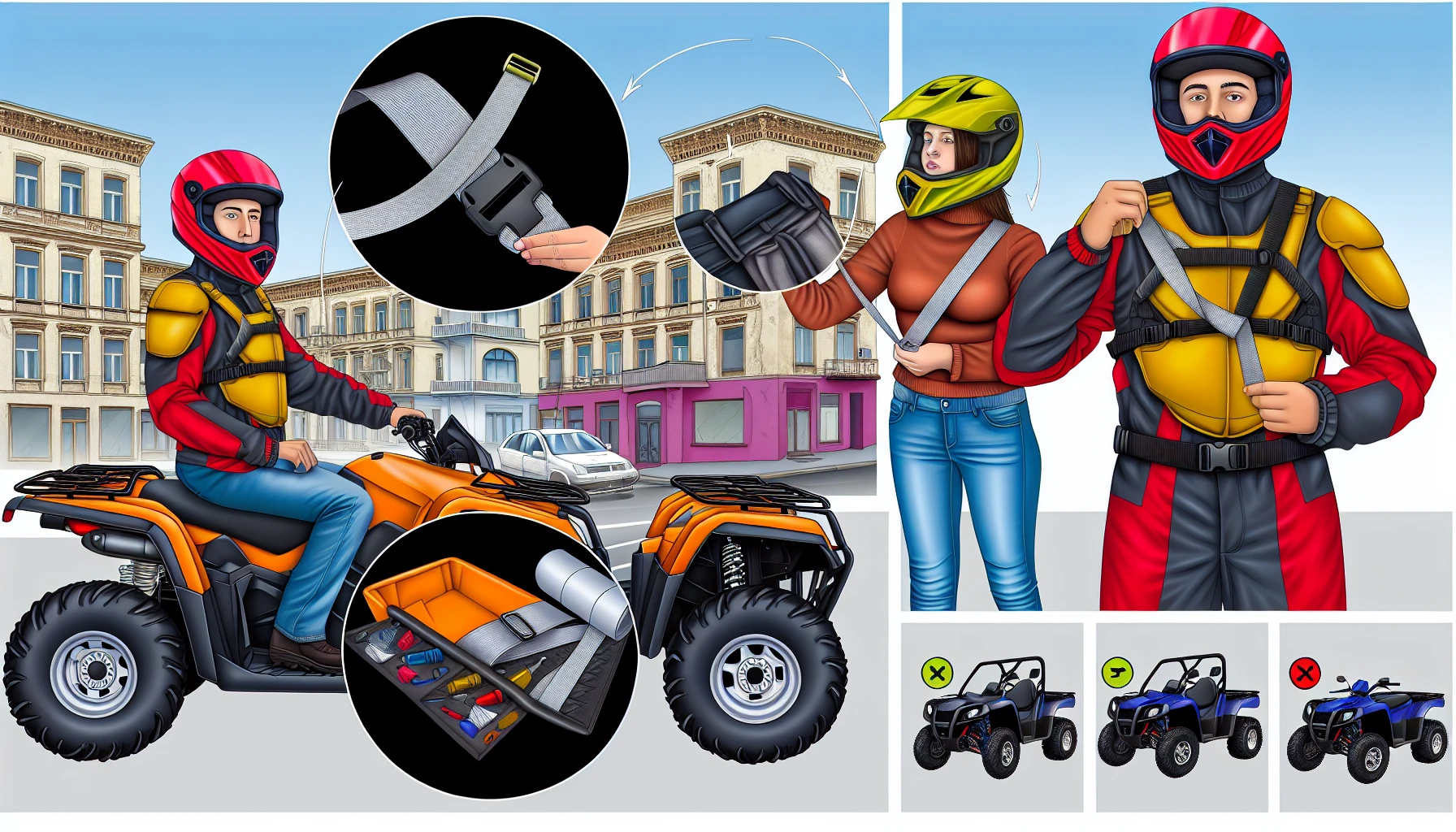All-terrain vehicles (ATVs) and utility task vehicles (UTVs) have become increasingly popular among outdoor enthusiasts and those in need of versatile transportation. But with their growing use, confusion about their street legality has also arisen, especially in the state of Georgia. Are ATVs and UTVs allowed on public roads? What are the specific requirements to make them street legal? In this blog post, we’ll clear up the confusion and provide a clear-cut guide to the rules and regulations surrounding ATVs and UTVs in Georgia, focusing on the question: are ATV street legal in Georgia?
We’ll explore Georgia’s specific laws and definitions for these off-road vehicles, discuss the differences between ATVs, UTVs, and other motorized vehicles, and delve into the requirements and restrictions for operating them on public roads. By the end of this guide, you’ll have a better understanding of the legal landscape for ATVs and UTVs in Georgia, and you’ll be better prepared to enjoy your off-road adventures responsibly, knowing whether or not are ATV street legal in Georgia.
Key Takeaways
- This article outlines the steps and requirements for making ATVs street legal in Georgia.
- It is mandatory to have insurance, registration documents, lighting & signal devices, helmets and seatbelts/roll bars when operating an ATV or UTV on public roads.
- Other states may have different laws regarding safety courses & age restrictions. It is important to be aware of them when travelling across state lines.
Understanding Georgia's ATV and UTV Laws
Georgia has specific laws and definitions pertaining to ATVs and UTVs, which are considered off-road vehicles and not street legal by default. These vehicles are only allowed to be operated on private land or on roads and trails explicitly designated for off-road use. Registration of a UTV for off-road use is not required in Georgia, as they are not classified as motor vehicles. However, ATVs and UTVs in the state must possess certain safety features, such as brake lights, turn signals, and a windshield.
Recognizing the differences between various types of motorized vehicles is key because Georgia law differentiates between low-speed vehicles and multipurpose off-highway vehicles, each with its unique set of requirements. We will further delve into these classifications in the subsequent sections, as well as provide a step-by-step guide on how to make your ATV or UTV street legal in Georgia.
Motorized Vehicle Designed for Off-Road Use
ATVs and UTVs are defined as motorized vehicles designed for off-road use. In Georgia, an ATV is a motorized vehicle. It has four low-pressure tires, a seat designed to be ridden upon by the driver, and handlebars for steering. A Recreational Off-Highway Vehicle (ROV) in Georgia is defined as having four or more non-highway tires and a maximum width of 65 inches, which is suitable for a person operating it off-road. Both ATVs and ROVs are off-road vehicles and are generally treated similarly under Georgia law.
The state further distinguishes between Class I and Class II all-terrain vehicles based on their dimensions, weight, and designed terrain. Class I ATVs are 50 inches or less in width with a dry weight of 1,200 pounds or less, while Class II ATVs are 65 inches or less in width with a dry weight of 2,000 pounds or less. Both classes of ATVs are designed to travel over various natural terrains on three or more nonhighway tires.
Low Speed Vehicles vs. Multipurpose Off-Highway Vehicles
Georgia law delineates between low-speed vehicles and multipurpose off-highway vehicles based on their speed capabilities. Low-speed vehicles have a maximum speed of less than 35 mph, while multipurpose off-highway vehicles can go at posted speed limits up to 65 mph. A low-speed vehicle in Georgia is a four-wheeled vehicle with a maximum speed of 20 to 25 miles per hour, equipped with the necessary safety and operational equipment, and can only be operated on highways with a posted speed limit of 35 miles per hour or less.
Multipurpose off-highway vehicles in Georgia have the following characteristics, making them suitable for various tasks and terrains. Such vehicle can:
- Transport persons or cargo or both
- Operate between 25 mph and 65 mph
- Have an overall width of 80 inches or less
- Be designed to travel on four or more wheels
- Utilize a steering wheel for steering control
- Have a nonstraddle seat
To register a multipurpose off-highway vehicle in Georgia, a 17-digit VIN number is required for the tag program. Note that there are exceptions to these requirements under Georgia law for specific vehicles and uses, so consulting the specific Georgia laws and regulations is necessary to ensure compliance.
Street Legality of ATVs in Georgia

While ATVs are not street legal in Georgia by default, there are ways to make them street legal, such as registering them in another state and meeting the required equipment standards. If you wish to make your ATV street legal in Georgia, you must adhere to the same laws and regulations that apply to motor vehicles. Operating an ATV on public roads without the necessary street legal precautions may result in receiving a citation or having the machine seized.
We will discuss the license plate requirements for street-legal ATVs and the required insurance and registration processes to make sure your off-road vehicle adheres to Georgia law in the subsequent sections.
License Plate Requirements
In order to acquire a license plate for an ATV in Georgia, owners of multipurpose off-highway vehicles (MPOHVs) may register for a license plate that authorizes them to operate such vehicles on county roads. However, operating a Can-Am side-by-side on public roads without a license plate may result in the issuance of a ticket. Being aware of the regulations for obtaining an ATV license plate in Georgia and ensuring that your vehicle is properly registered is paramount.
Since Georgia does not necessitate registration for vehicles intended for off-highway use, there is no particular procedure for registering an ATV in Georgia. However, if you wish to make your ATV street legal, you can register it in another state, such as South Dakota or Montana, and meet the required equipment standards.
Insurance and Registration
Having proper insurance and registration is necessary for street-legal ATVs in Georgia. If you intend to ride your ATV on the road, it’s mandatory to have insurance. While Georgia does not permit ATV registration on public roads, operating one without proper registration can result in a fine of $300 plus the cost of prosecution.
Carrying physical copies of your insurance and registration documents while driving your ATV is necessary. This will help you avoid potential penalties and ensure that you’re adhering to Georgia’s ATV and UTV laws.
Equipment Requirements for ATVs and UTVs in Georgia

In order to be a street legal vehicle in Georgia, ATVs and UTVs must meet specific equipment requirements. Proper lighting and signal devices, as well as safety features such as helmets, seat belts, and roll bars, may be mandated for these off-road vehicles.
We will discuss the specific equipment requirements for ATVs and UTVs in Georgia in the subsequent sections.
Lighting and Signal Devices
Proper lighting and signal devices are essential for street-legal ATVs and UTVs in Georgia. These vehicles must be equipped with:
- Headlights
- Brake lights
- Turn signals
- Reflectors
Additionally, all terrain vehicle and UTVs must have a windshield. Although there are no particular brightness or luminosity specifications for ATV and UTV lights in Georgia, it’s imperative to ensure that your vehicle’s lighting is visible and compliant with state regulations.
Signal devices are also important for street-legal ATVs and UTVs in Georgia. UTVs must be equipped with the following to be classified as street legal:
- License plate
- Brake lights
- Turn signals
- Windshield
Ensuring that your motor vehicle also meets these requirements in such a manner will help you avoid potential fines and penalties.
Safety Features
Safety features like helmets, seat belts, and roll bars may be required for street-legal ATVs and UTVs in Georgia. Adequate brakes, seat belts, and roll cages are necessary when operating ATVs and UTVs in the state. Additionally, helmets are obligatory for ATV and UTV riders in Georgia.
It’s important to adhere to these safety requirements to ensure a safe and enjoyable riding experience. By equipping your ATV or UTV with the proper safety features, you not only protect yourself and your passengers but also comply with Georgia’s ATV and UTV laws.
Where Can You Operate an ATV or UTV in Georgia?

In Georgia, ATVs and UTVs can only be operated on public lands, designated roads, trails, or specific off-road areas. A driver’s license is also mandatory for public land use. It’s crucial to be aware of the places where you are allowed to operate your ATV or UTV, as driving in unauthorized areas can result in fines and penalties.
We will discuss the restrictions and regulations regarding the operation of ATVs and UTVs on public roads and highways, as well as city streets and local roads in Georgia in the subsequent sections.
Public Roads and Highways
ATVs and UTVs are not allowed on public roads and highways in Georgia unless they meet specific requirements and have proper registration. If you wish to operate your ATV or UTV on public roads, it’s essential to adhere to the necessary regulations, including obtaining proper registration and meeting equipment requirements. Failure to comply with these regulations can result in fines and penalties, including a $750 fine for the first violation and a $1,000 fine for a second violation.
While there are no exceptions allowing ATVs and UTVs to operate on public roads in Georgia, it’s important to be aware of the regulations in place to ensure compliance and avoid potential penalties.
City Streets and Local Roads
City streets and local roads may have additional restrictions and regulations for ATV and UTV use in Georgia. It’s important to consult with local authorities to understand the specific rules and regulations in your area. ATVs and UTVs are only allowed to be operated on private property or on roads and trails that are designated for off-road use in Georgia.
Driving your motorcycle, ATV or UTV on city streets or local roads without proper authorization can result in fines and penalties, including a $750 fine for the first violation and a $1,000 fine for a second violation. It’s crucial to adhere to local regulations and only operate your off-road vehicle in designated areas.
Special Use Exceptions and Permits
Georgia has special use exceptions for government work, farming, and mining, which may allow ATVs and UTVs to be eligible for road use under certain conditions. These exceptions provide some flexibility in the operation of off-road vehicles for specific purposes, as long as the necessary permits and equipment requirements are met.
We will discuss the special use exceptions in more detail, including the allowances for ATVs and UTVs used in government work, farming, and mining in the subsequent sections of code section.
Government Work and Farming
ATVs and UTVs used for government work or farming may be allowed on public roads with proper permits and equipment. To acquire a permit for ATV and UTV use in agricultural activities in Georgia, you may contact the DNR Law Enforcement Division - Special Permit Unit at 770-918-6408. ATVs used for agricultural purposes must have front license plates and an orange triangle affixed to the rear, and UTVs may only operate on designated streets and must meet distinct equipment requirements.
By obtaining the proper permits and adhering to equipment requirements, ATVs and UTVs used in government work and farming can be operated on public roads in Georgia, providing additional utility for these off-road vehicles in specific circumstances.
Mining and Other Industrial Uses
Mining and other industrial uses may also qualify for special use exceptions, allowing ATVs and UTVs to be used on public roads in Georgia. To apply for a permit to use an ATV or UTV for mining in Georgia, one can visit the website of the Georgia Environmental Protection Division (EPD) and fill out the surface mining forms. ATVs and UTVs utilized in mining and other industrial uses in Georgia are mandated to possess certain safety features, including daily inspections to ensure the absence of safety defects, the inclusion of a first-aid kit and fire extinguisher in UTVs, and adherence to safety standards.
Following the necessary safety requirements and obtaining the proper permits, ATVs and UTVs used in mining and other industrial activities can be operated on public roads in Georgia, providing additional versatility for these off-road vehicles in specific industries.
Comparing Georgia's ATV Laws to Other States
Georgia’s ATV laws differ from other states, with some states like South Dakota and Montana allowing for easier street-legal registration. As you travel across state lines, it’s essential to be aware of the different rules and regulations regarding ATV and UTV use to ensure compliance and avoid potential penalties.
We will explore the more lenient ATV laws in South Dakota and Montana and compare Georgia’s ATV laws to those of its neighboring states in the subsequent sections.
South Dakota and Montana
South Dakota and Montana have more lenient ATV laws, allowing for easier registration and street legality. In South Dakota, ATVs and UTVs are permitted to be driven on public streets and roadways, provided they meet certain conditions to make them street legal. To register an ATV in South Dakota, it is necessary to:
- Complete an application form with the corresponding vehicle information
- Provide the owner’s name
- Provide a copy of the owner’s social security card
- Provide a valid driver’s license
- Provide proof of ownership
In Montana, all riders aged between 11 and 16 are obliged to complete an authorized ATV Safety Course and possess the Montana ATV Safety Education Certificate. Furthermore, ATV riders aged between 12 and 16 who do not hold a driver’s license must have a Montana OHV (Off-Highway Vehicle) registration. Montana will register and title your ATV as a street-legal quadricycle, allowing for more flexibility in the use of your off-road vehicle.
Neighboring States
Neighboring states may have different ATV laws and regulations, so it’s essential to be aware of the rules when traveling across state lines. Here are some examples:
- Florida does not permit ATVs on public roads or streets.
- North Carolina allows certain types of ATVs and UTVs on public roads with specific requirements.
- In Alabama, ATVs are not permitted on public roads, highways, or streets, unless they are being utilized for agricultural purposes.
It’s crucial to familiarize yourself with the ATV laws and regulations of the states you plan to visit or travel through, as penalties for non-compliance with new law can include fines and even incarceration for repeated violations. By staying informed and adhering to the laws of each state, you can enjoy your off-road adventures responsibly and legally.
Summary
In conclusion, Georgia has specific laws and requirements for ATVs and UTVs, which are considered off-road vehicles by default. To make your ATV or UTV street legal in Georgia, you must adhere to certain equipment requirements and may need to register your vehicle in another state. Additionally, proper insurance and registration are necessary for street-legal ATVs and UTVs in the state.
By understanding and complying with Georgia’s ATV and UTV laws, as well as the laws of neighboring states and other states you may travel through, you can ensure a safe and enjoyable off-road experience. So, gear up, hit the trails, and explore the great outdoors with confidence, knowing that you’re doing so responsibly and legally.
Frequently Asked Questions
Can I make my ATV street legal in Georgia?
Unfortunately, Georgia does not allow UTVs to be registered as regular street legal vehicles, so it is not possible to make your ATV street legal.
Is ATV insurance required in Georgia?
Yes, ATV insurance is required in Georgia as a minimum auto liability limit when driven on public roads. Your agent may suggest additional coverage too.
Are go karts street legal in Georgia?
Yes, go karts can be street legal in Georgia as long as certain requirements are met, such as having 4 wheels and a maximum speed of 25 mph.
Are there any special use exceptions for ATV and UTV use in Georgia?
Yes, Georgia has special use exceptions for ATV and UTV use in government work, farming, and mining under certain conditions.
How do Georgia's ATV laws compare to those in neighboring states?
Georgia's ATV laws differ from its neighboring states in terms of registration, road usage, and speed limits. As such, it's important to familiarize yourself with the laws of each state you plan to visit or travel through to ensure compliance and avoid potential penalties.

